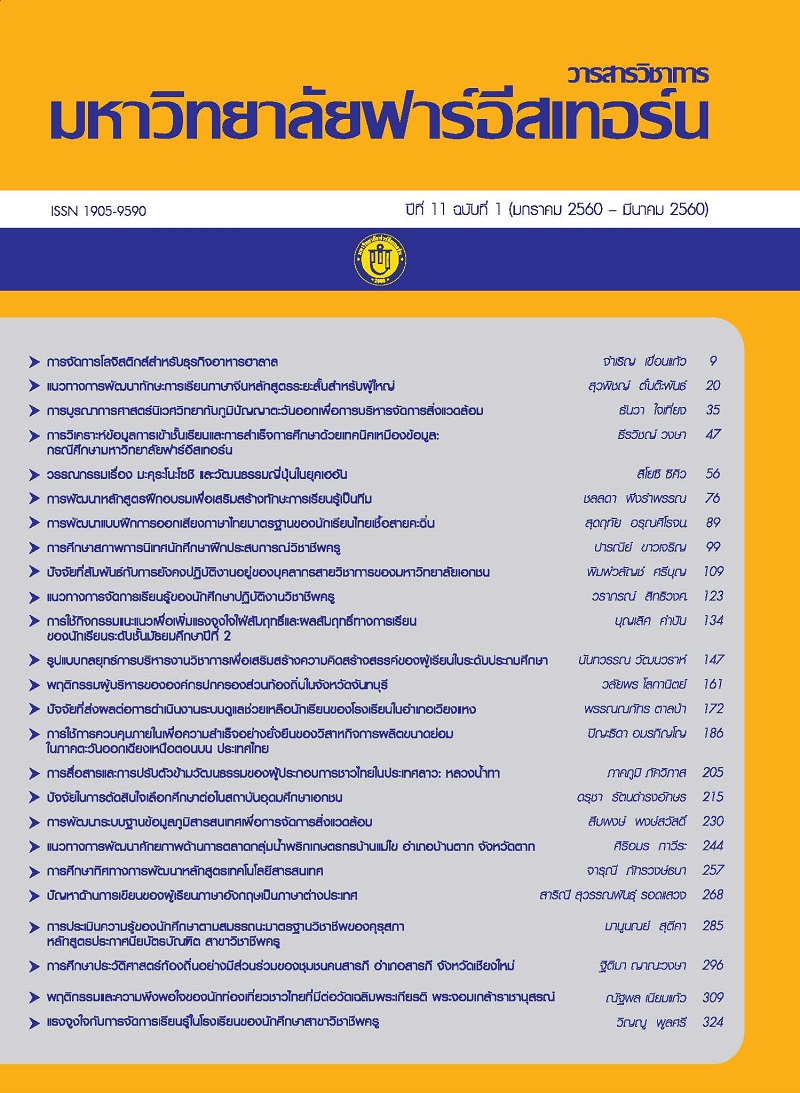การสื่อสารและการปรับตัวข้ามวัฒนธรรม ของผู้ประกอบการชาวไทยในประเทศลาว: หลวงนํ้าทา
Main Article Content
Abstract
บทคัดย่อ
การศึกษานี้มีวัตถุประสงค์เพื่อศึกษาระดับการสื่อสารต่างวัฒนธรรมผู้ประกอบการชาวไทยในประเทศลาวและ ศึกษาระดับการปรับตัวของผู้ประกอบการชาวไทยในประเทศลาว ซึ่งเป็นการวิจัยเชิงประมาณโดยประชากรซึ่งกลุ่มตัวอย่าง ได้แก่ นักธุรกิจ/ผู้ประกอบการชาวไทยที่ดำเนินธุรกิจในสาธารณประชาธิปไตยประชาชนลาว จำนวน 20 และการสุ่มตัวอย่าง โดยไม่ใช้ความน่าจะเป็น ด้วยวิธีเจาะจง (Purposive sampling technique) เครื่องมือที่ใช้ได้แก่แบบสอบถามแบบมีโครงสร้าง ข้อมูลที่ได้จะนำมาวิเคราะห์ด้วยวิธีการหาค่าความถี่ ร้อยละ ค่าเฉลี่ย ส่วนเบี่ยงเบนมาตรฐาน และการศึกษาถึงความสัมพันธ์ ด้วยค่าสัมประสิทธิ์สหมัมพันธ์ (Pearson product-moment correlation coefficient :r) โดยโปรแกรม SPSS
ผลการศึกษาพบว่าผู้ตอบแบบสอบถามส่วนใหญ่ เป็นเพศชาย คิดเป็นร้อยละ 70มีอายุระหว่าง 41 – 50 ปี คนคิดเป็นร้อยละ 50 มีระดับการศึกษา ระดับปริญญาตรี คิดเป็นร้อยละ 55 ซึ่งส่วนมากแล้วป็นผู้บริหาร คิดเป็น ร้อยละ 55 และมีประสบการณ์ในการทำงานในองค์กร มากกว่า 10 ปี คิดเป็นร้อยละ 80 นอกจากนี้ ส่วนมากธุรกิจนั้นดำเนินการมาอยู่ระหว่าง 3 -5 ปี คิดเป็น ร้อยละ 35 และมีรายได้เฉลี่ยต่อเดือนของธุรกิจอยู่ที่ 2-3 ล้านบาท คิดเป็นร้อยละ 40 ผลจากการศึกษาทางด้านการสื่อสารต่างวัฒนธรรม พบว่าผู้ตอบแบบสอบถามส่วนใหญ่ให้ระดับความคิดเห็นในระดับมากที่สุด ได้แก่ ด้านการสื่อสารภายใต้สังคมของกลุ่มชาติพันธุ์ตนเอง และด้านการสื่อสารภายในสังคมเจ้าบ้าน และให้ความคิดเห็นในระดับมากได้แก่ ความสามารถในการสื่อสารภายใต้วัฒนธรรมเจ้าบ้าน และ สิ่งที่ติดตัวผู้แปลกหน้าก่อนที่จะเข้ามาอยู่ในวัฒนธรรมใหม่ ผลจากการศึกษาทางด้านการปรับตัวพบว่าผู้ตอบแบบสอบถามให้ระดับความคิดเห็นมากที่สุดได้แก่การปรับตัวด้านความพฤติกรรม และในระดับมากได้แก่ การปรับตัวด้านความคิด การปรับตัวด้านความรู้สึกตามลำดับ ผลการทดสอบความสัมพันธ์พบว่าปัจจัยด้านการสื่อสารในสังคมเจ้าบ้านมีความสัมพันธ์กับการปรับตัวด้านพฤติกรรม ส่วนปัจจัยด้านความสามารถในการสื่อสารภายใต้วัฒนธรรมเจ้าบ้าน มีความสัมพันธ์กับการปรับตัวด้านความคิด และการปรับตัวด้านความรู้สึก
Abstract
The objectives of this study were first to study of multicultural communication of Thai entrepreneurs in Laos. Second, to study cross cultural adaptation of Thai Entrepreneurs in Laos. Quantitative analysis was adapted and questionnaire was used to collect data from 20 Thai entrepreneurs in Laos that selected by Purposive sampling technique. Data were analyzed by using descriptive statistics and correlation analysis by (Pearson product-moment correlation coefficient: r) using SPSS program.
Result shown that majority of respondents were male (70%) who were age between 41-50 years old (50%) and earned bachelor degree (55%). In addition, their position was manager (55%) and had over 10 years of experience (80%). Most of the business had been launched in Laos between 3-5 years (35%) which generated 2-3 million baht per month (40%). Result of multicultural communication indicated that most of respondent strongly agreed on Ethnic Social Communication ( = 4.40, S.D. = 0.60) and Host Social Communication ( = 4.21, S.D. = 0.36) factors. However, they agreed on Host Communication Competence ( = 3.98, S.D. = 0.64) and Predisposition ( = 3.65, S.D. = 0.24) factors. The result of cross cultural adaptation found that most of respondent strongly agreed on Behavior Component ( = 4.21, S.D. = 0.38). However they agreed on Cognitive Component ( = 4.06, S.D. = 0.31) and Affective Component ( = 3.96, S.D. = 0.32). Result of hypothesis testing shown that first, there was relationship between Host Communication Competence and Behavior Component. Second, there was relationship between Host Communication Competence and Cognitive Component, Affective Component.
Article Details
1. Any views and comments in the Journal of Social Innovation and Lifelong Learning are the authors’ views. The editorial staff have not to agree with those views and it is not considered as the editorial’s responsibility.
2. The responsibility of content and draft check of each article belongs to each author. In case, there is any lawsuit about copyright infringement. It is considered as the authors’ sole responsibility.
3. The article copyright belonging to the authors and The Far Eastern University are copyrighted legally. Republication must be received direct permission from the authors and The Far Eastern University in written form.
References
เอกสารอ้างอิง
กรมอาเซียน กระทรวงต่างประเทศ. (2555). ความเป็นมาของอาเซียน. สืบค้นเมื่อวันที่ 20 มกราคม 2559,จาก http://www.mfa.go.th/web/3030.
วารินทร์ วงศ์หาญเชาว์. (2547).ยุทธศาสตร์การค้าชายแดนและการค้าผ่านแดนประเทศไทยกับประเทศในกลุ่มอนุภูมิภาคลุ่มแม่น้ำโขง.กรุงเทพฯ: สถาบันยุทธศาสตร์การค้า.
วิภาพร มาพบสุข. (2540). จิตวิทยาทั่วไป. กรุงเทพฯ : ศูนย์ส่งเสริมวิชาการ.
รัฐนันท์ พงศ์วิริทธิ์ธร. (2558). แนวทางการพัฒนาการกระจายสินค้าอาหารแปรรูปไทยสู่เชียงรุ่ง. มหาวิทยาลัยเทคโนโลยีราชมงคคลล้านนา. เชียงใหม่.
Chen, G.-M., & Starosta, W. J. (2008). Intercultural communication competence: A synthesis. In M. K. Asante, Y. Miike, & J. Yin (Eds.), The global intercultural communication reader (pp. 215–237). New York: Routledge.
Hinkle, D.E, William ,W. and Stephen G. J. Applied Statistics for the Behavior Sciences. 4th ed. New York : Houghton Mifflin, 1998
Jandt, F.E. (1998). International Communication: An introduction (2ed). California: Sage Publication, Ind.
Kim, Y. Y. (1977). Communication patterns of foreign immigrants in the process of acculturation. Human Communication Research, 2, 127-224.
Kim, Y. Y. (1988). Communication and cross-cultural adaptation: An integrative theory. Clevedon, UK: Multilingual Matters.
Kim, Y. Y. (1997). Adapting to a new culture. In L.A. Samovar and R.E. Porter (Eds.), Intercultural Communication: A reader (8th ed., pp. 404-416). Belmont, CA: Wadsworth.
Larry A. Samovar, Richard E. Porter, Edwin R. McDaniel, (2012), Intercultural Communication. Intercultural Communication: 13th Edition
Lustig, M. W. and Koester, J (1993) Intercultural Competence: Interpersonal
Communication Across Cultures. New York: HarperCollins College Publishers.
Ruben, B.D., S. (1999). Communication and Human Behavior. Allyn and Bacon.
Stephen W. Littlejohn, Karen A. Foss, (2009) Host and Ethnic Social Communication, Encyclopedia of Communication Theory, SAGE Publications.
Triandis, H.C. (1971). Attitude and Attitude Change, New York: John Wiley

